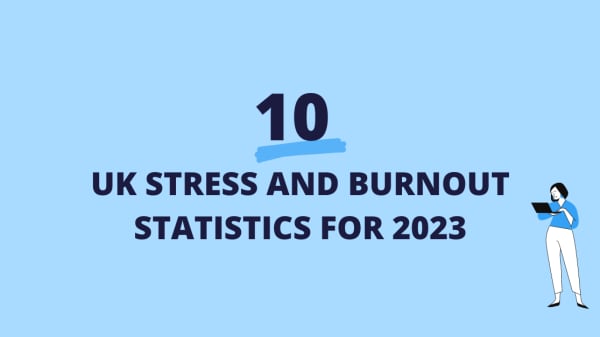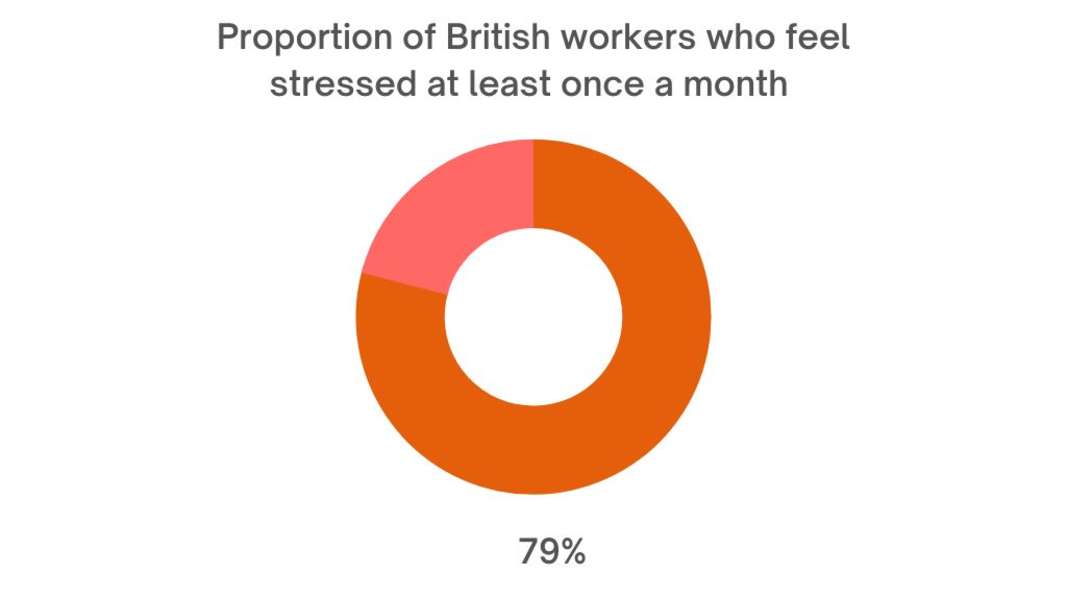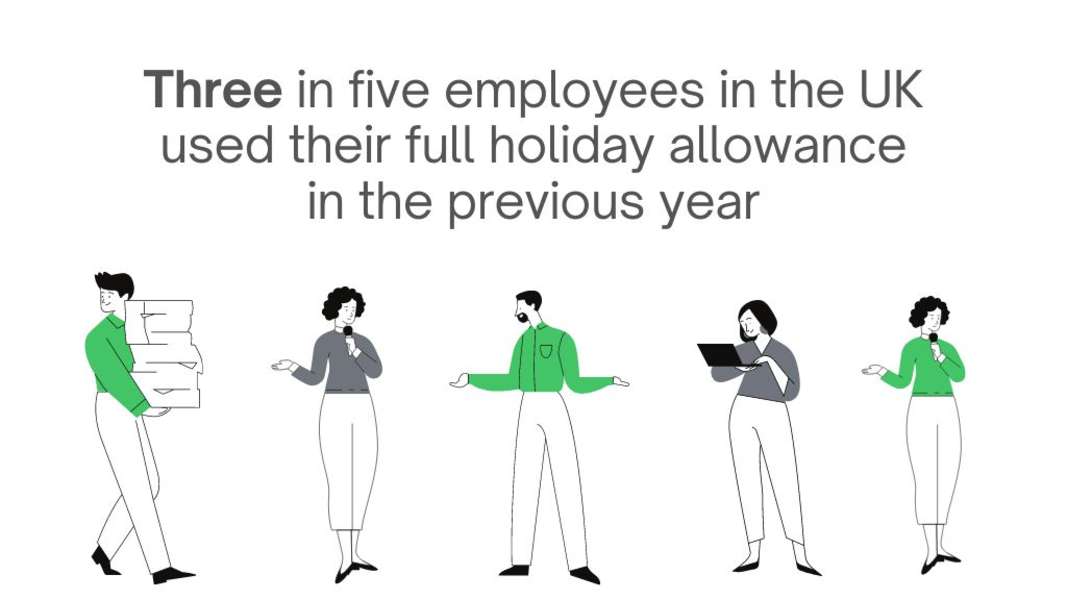
10 UK Employee Stress And Burnout Statistics (2023)
August 18, 2022

Burn-out is a specific type of work-related stress - a state of physical, mental, and emotional exhaustion. It can reduce productivity at work and lead to feelings of apathy and detachment.
Burn-out is not simply a case of working too hard or being under too much pressure; it is a response to chronic stressors that are not adequately managed. In 2023, the International Classification of Diseases, the World Health Organization's handbook, will recognize "burn-out" as an official diagnosis.
How burnt out are the employees in the UK? Let's dive right in.
Key UK Burnout Statistics, Trends, and Facts
1. The majority of adults feel stressed every month
According to the survey by CIPHR, an overwhelming majority of British adults (79%) feel stressed at least once a month. The study found that stress levels are the highest among 18-24-year-olds, with close to 90% reporting feeling stressed every month.
2. One in five British worker feels stressed more days a month than they don’t
One in five UK citizens feel stressed more days a month than they don’t, a CIPHR survey has shown. A survey showed that 18-24-year-olds feel stressed the most days a month compared to the other age groups, with an average of 9.82 days in a month. Those aged 55+ are the least stressed.
3. Over half of the workers agree that moderate stress enables them to thrive
The Workplace Health Report revealed that 56% agree that the appropriate amount of stress enables them to thrive in their professional life.
4. Almost half of UK employees are close to burnout
According to the research conducted by Westfield Health, close to half (46%) of the UK workers are close to burnout.
Comparing workers' responses to the COVID-19 pandemic across the UK, the researchers found those who have worked from home for the last 18 months are more likely to feel at risk of burnout (50%) than those who have been going to a workplace (41%).
5. Cambridge ranks number 1 for online “burnout” searches
A survey by CIPHR has found that Cambridge is the number 1 city in the UK for online searches related to burnout. Here’s the list of the top 5 cities:
| Town / City | Searches per 10,000 people in the last 12 months |
|---|---|
| Cambridge | 6.05 |
| Oxford | 4.99 |
| Edinburgh | 3.28 |
| Bedford | 3.21 |
| Bristol | 3.12 |
What stands out is that the top three cities for burnout searches are well-known for their famous universities.
6. Brits are more exhausted than ever before
New research published by Arctic Coffee has revealed that the comeback of a busy everyday life with returning to the office, commuting, and social life changes has left 42% of people feeling more exhausted in 2023 than ever before.
7. 3 in 5 workers used their full holiday entitlement in the past year
According to a Glassdoor survey, around three-quarters (72%) of employees in Britain in full-time employment viewed annual leave as an effective method to lessen burnout.
Nevertheless, many workers did not make full use of their holiday allocation. Only 60% of employees used their full holiday allowance in the previous year.
8. Reports of burnout has increased 48%
UK employee reports of burnout have skyrocketed to record levels in the past year. A recent study by Glassdoor’s economic researchers, which analyzed more than 382,000 employee reviews revealed that the reports of burnout among British workers increased by 48% to record levels.
Although 72% of British employees surveyed believe that the annual holiday is good for enhancing their well-being, only every third worker (34%) says their company encourages them to take it.
9. Increased workload as the top catalyst for burnout
Champion’s data reveals that the number one cause of work-related stress is workload (78%), followed by other issues including lack of support, lack of control, and senior staff members.
10. Millions of working days annually are lost due to stress
According to NICE, an estimated 13.7 million workdays are lost every year in the UK due to work-related stress, anxiety, and depression, costing £28.3 billion in lost productivity.
Which age groups are most likely to be affected by stress?
It is a well-known fact that stress affects people of all ages. However, some age groups are more likely to be affected by stress than others. In the UK, for example, the age group most likely to be affected by stress is adults aged 18-34. This is followed closely by adults aged 35-49.
There are many reasons why these age groups are more likely to be affected by stress. One of the main reasons is that they are more likely to have responsibilities such as work and family commitments.
This can often lead to them feeling overwhelmed and stressed out. Another reason is that these age groups are more likely to experience major life changes, such as getting married or having a baby. These changes can also be stressful and cause anxiety levels to rise.
Which UK cities are the most stressed?
A recent study has found that the majority of UK residents believe that they live in one of the most stressed cities in the world. The research, conducted by the University of Manchester, surveyed 2,000 people in 10 major cities across the UK.
The study found that Londoners are the most likely to feel stressed, with nearly 70% of respondents saying that they often feel overwhelmed by stress. This is followed by Birmingham (60%), Manchester (58%), and Glasgow (57%).
So what makes these cities so stressful? The study found that high levels of crime, unemployment, and poverty are all major contributors to stress levels in urban areas. In addition, residents of these cities also reported high levels of traffic congestion and poor air quality.
What is the main cause of stress in the UK?
The main cause of stress in the UK is work, according to a new survey. The poll of 2,000 adults found that four in ten (39%) say their job is the biggest source of stress in their life. This is followed by money worries (34%), family responsibilities (29%), health concerns (28%), and keeping up with friends and social media (26%).
How many people take time off work for stress?
In the UK, an estimated one in four workers takes time off work for stress. This number has been increasing over the past few years, as more and more people feel the pressure of work-related stress.
There are several reasons why people may take time off work for stress. Some may feel that their job is simply too stressful and they need a break to recover. Others may have a specific event or situation that has caused them stress, such as a death in the family or a difficult project at work.
Whatever the reason, it is clear that stress is having a significant impact on workers in the UK. If your employees are feeling stressed at work, it is important to talk to them and see if there is anything they can do to help you. You may also want to consider offering them some time off to relax and recharge their batteries.
What can HR do to reduce employee stress?
HR can play a big role in reducing team stress. By being proactive and creating a healthy work environment, HR can help to reduce the amount of stress that employees feel.
There are a few things that HR can do to reduce team stress:
Encourage open communication: By creating an environment where employees feel comfortable communicating with each other, HR can help to reduce the amount of stress that employees feel. Employees should feel like they can openly share their concerns and problems without feeling judged or ridiculed.
Promote healthy lifestyle choices: Encouraging employees to live healthy lifestyles can help to reduce the amount of stress that they feel. This includes promoting healthy eating habits, exercising, and getting enough sleep.
Help employees manage their time: Time management is a major source of stress for many employees.
Employee well-being reviews: An employee well-being review can be an important process to implement when checking in on your employees.
Employee stress and burnout are significant problems in the UK, with statistics showing that the issues are likely to get worse in the next few years.
Ultimately, the goal of HR is to create a positive and productive work environment where employees can thrive. By working closely with managers and employees, HR can help to create a workplace that everyone enjoys coming to each day.
Prevention of stress and burnout needs to remain an important focus of employers, and employees themselves need to be proactive in managing their well-being and stress levels.
Boost your hiring power.
Start using Neuroworx today.
Talk is cheap. We offer a 7-day free trial so you can see our platform for yourselves.
Try for free




